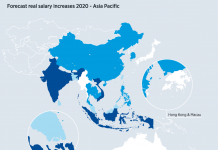The HR technology industry will experience continuing growth and evolution in 2020 as new players enter the market, organisations turn to technology for further efficiency and productivity gains, and venture capitalists remain enticed by the promise of HR tech firms, industry experts say.
Yet despite that promising outlook, there are growing concerns about the expanding use of technologies like artificial intelligence (AI), the range of data analysis skills needed in HR to interpret information generated by new technologies, and the stubborn lack of functionality in some talent management platforms.
In several interviews conducted by SHRM Online, industry experts revealed six trends and developments that we can expect to see in HR technology moving into 2020.
Self-service Technologies
With the rapid advancement of technology, HR functions have increasingly adopted tech platforms that include both employee self-service (ESS) and manager self-service (MSS) tools to make HR information more accessible.
While such services have their benefits, certain experts believes that the effectiveness of self-service tech for HR administration will vary on a case-by-case basis.
The main issue involves placing too much burden on line managers to accomplish HR-related tasks via the use of MSS. The same could also be said for ESS tools in areas like learning and development. Overwhelming employees and managers with such a wide range of self-service options could prove detrimental without the right instruction or training.
AI Adoption
The benefits of AI and machine learning are becoming more apparent with each passing year. Consequently, HR will continue to deploy such technologies as well. Expert opinions are varied however; especially regarding the pace of growth and how AI will expand beyond its current uses in HR.
Stacey Harris, vice president of research and analytics for Sierra-Cedar, believes that in the next 10 years, up to 50 percent of organisations will have HR technology that provides daily recommendations and workforce insights based on AI and machine learning.
Other experts believe the current global talent shortage will force recruiters to grow ever more creative in using the latest sourcing technologies and tools to find in-demand talent. Data science and AI algorithms can help recruiters better understand which passive candidates are open to changing jobs or engaging with recruiters, for example.
Specialised Tech Skills
All this new technology will ultimately be useless unless HR and learning groups can create increasingly agile and effective reskilling strategies for workers. After all, the advent of automation and digitalisation is continuously reshaping job roles and skill needs in every industry.
A recent study from research and consulting firm, Gartner, found that only 9 percent of chief human resource officers agree that their organisations are prepared for the future of work, and 46 percent of HR leaders report that their employees lack the technology skills necessary to drive future performance.
This reveals that it is not only HR leaders who are concerned over the lack of appropriate skills to utilise new technologies, but the employee themselves as well.
Work Redesign
Rather than trying to recruit from an ever-shrinking supply of skilled workers, organisations should consider alternative methods; such as redesigning job roles. Instead of constantly chasing supply, why not change the demand?
More often than not, organisations create very narrowly defined job roles with very specific requirements and criteria that must be met. This makes it incredibly difficult to find the right workers for the job.
According to Leah Johnson, vice president of advisory at Gartner, companies can mitigate skill imbalances by redeploying staff continuously across teams, unbundling job roles into specific competencies, and leveraging technology systems and tools to reduce talent dependencies, not to create them.
HCM Solutions
Flat organisational structures and teams have been growing in popularity throughout many organisations. However, many human capital management (HCM)solutions have not been built to support those structures. Experts believe that this will all change in 2020.
A more use-friendly and efficient experience will be needed to provide employees the ability to adapt to the increasingly agile changes to the business environment and strategies. ADP, a HR technology company, believes that these changes will push more HCM providers to deliver improved levels of system uptime and scalability.
Workers in 2020 also will have changing needs about how and when they get paid, according to ADP’s research. As a result, the pay experience will become more personalised, with easier ways for workers to be paid the way they want, when they want, said Don Weinstein, corporate vice president of global product and technology at ADP.
Data Privacy
According to Cecile Alper-Leroux, vice president of HCM innovation at Ultimate Software, HR leaders and technology solutions will play a growing role in helping to reach the right balance in terms of employee trust and data privacy.
Alper-Leroux also mentions that employees today internally expected to be treated like customers, especially with regards to how their personal data is handled. Many expect more transparency and control over their data. In many aspects, It is up to HR to ensure that the policies and technology systems being used will provide the right level of transparency, as well as an adequate level of protection for employee data.






















